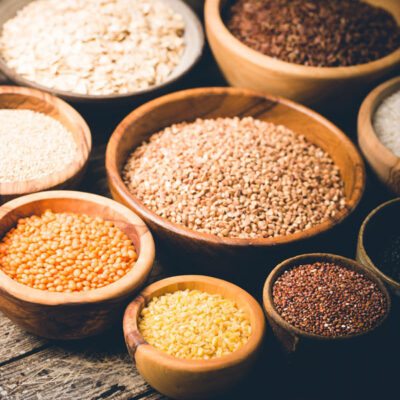Brands
What Are 5 Benefits of Organic Food?
By: Admin On: 17 February 2025

Is organic really best? 5 benefits of organic food; from better health to environmental sustainability. Learn why organic food deserves a place on your plate.
If you've wandered the aisles of your local grocery store or farmers' market recently, chances are you've noticed the increasing variety of organic options available. From fruits and vegetables to meat, dairy, and snacks, the organic food movement is stronger than ever. But what are the benefits of organic food, and is it worth the investment?
For health-conscious consumers and eco-friendly shoppers alike, organic food offers a range of benefits that go beyond just avoiding pesticides. This article explores five powerful reasons why organic food might just be the better choice for your plate, your planet, and your palate.
A Healthier Nutrient Profile
Studies show that organic produce often has higher concentrations of essential nutrients like vitamins, minerals, and antioxidants than conventionally grown food. For example, research published in the British Journal of Nutrition found that organic fruits and vegetables can have up to 69% more antioxidants, which play a critical role in reducing oxidative stress and protecting your body from chronic diseases.
What causes this boost in nutrients? The secret lies in how organic food is grown. Organic farming emphasizes soil health through natural composting and crop rotation, leading to nutrient-rich soil that produces healthier, nutrient-dense crops. Additionally, since organic plants aren’t treated with synthetic pesticides, they produce more of their natural protective compounds, like antioxidants, to defend against pests.
No Harmful Chemicals
One of the top concerns about our food supply is exposure to harmful chemicals in food. Conventional farming often relies on synthetic pesticides, herbicides, and chemical fertilizers to grow crops. These chemicals can leave residues on your food—even after washing—and may carry long-term health risks.
On the contrary, organic farming prohibits the use of such chemicals. Instead, natural alternatives like compost, organic fertilizers, and biological pest control methods are employed. This means that when you bite into an organic apple or take a sip of organic milk, you can enjoy peace of mind knowing it's free from harmful residues.
Not only does this benefit your health, but it also helps protect farmers and agricultural workers. By choosing organic food, you're making a conscious decision to reduce your exposure to toxic substances while supporting safer farming practices for everyone involved.
Find out more in our article 'Understanding pesticides in our produce'.
Better for the Environment
Organic farming goes beyond personal health. It is also about preserving and restoring the health of the environment. Here’s how organic practices have a positive environmental impact.
Promoting Soil Health
Organic farming builds fertile, nutrient-rich soil by avoiding chemical fertilizers and using crop rotation, cover crops, and composting. Healthy soil, in turn, contributes to better water retention and reduced erosion.
Reducing Pollution
Without chemical pesticides or fertilizers, organic farms produce less pollution. These chemicals, commonly used in conventional farming, often run off into rivers and lakes, harming aquatic life and ecosystems.
Conserving Water
Organic farming methods prioritize water conservation by using techniques like drip irrigation and mulching. This ensures that valuable water resources aren't wasted.
By choosing organic food, you're not just making a difference for yourself—you’re also reducing your carbon footprint and advocating for sustainable farming practices. It’s a win-win for people and the planet!
Read more about how choosing organic food promotes sustainable living.
Supports Animal Welfare
Organic farming prioritizes animal welfare, adhering to ethical practices that ensure animals are treated with care and dignity. Here’s what sets organic animal products apart.
- Animals are provided with access to the outdoors, allowing them to roam and graze freely.
- They are fed organic diets, free from antibiotics, hormones, and genetically modified organisms (GMOs).
- Farming practices focus on raising animals in stress-free conditions, minimizing overcrowding and improving their overall quality of life.
For example, organic dairy cows are given outdoor grazing opportunities, ensuring they live healthier, happier lives. Similarly, chickens on organic farms are kept in conditions that allow them to exhibit their natural behaviours, such as scratching and foraging.
By supporting organic farming, you’re helping to raise the standard for animal welfare across the food industry.
It Tastes Better
Last but definitely not least, organic food often tastes better. Many people find that organic fruits and vegetables are richer in flavour, while organic meat and dairy products have a more robust and natural taste.
Why does organic food taste better? One reason could be the absence of synthetic additives that might dull natural flavours. Additionally, organic crops are often grown in smaller batches and harvested at peak ripeness, allowing their full flavors to develop.
If you've tasted an organic strawberry bursting with sweetness or sipped on a cup of coffee made from organic beans, you'll know what we’re talking about. Even picky eaters often notice the superior flavour of organic food and agree that it’s worth the switch.
Make Organic Food a Part of Your Lifestyle
From better health to a cleaner planet, there’s no denying the appeal of organic food. By choosing organic, you invest in food that’s nutrient-rich, ethical, environmentally friendly, and bursting with flavour. Whether you're browsing the farmers' market or reviewing labels at your local grocery store, keep these benefits in mind to make more informed choices.
If you're new to organic food, start small. Experiment with swapping just a few conventional items for their organic alternatives—like replacing your regular apples with organic ones or switching to organic milk. Not only will you taste the difference, but you'll feel good knowing you're supporting sustainable practices.
Curious about the best organic food options or how to shop smart on a budget? Stay tuned for more tips and tricks on integrating organic living into your routine. Together, we can make healthier, more eco-friendly choices one meal at a time.
Why not start by exploring our range of organic wholesale food?






